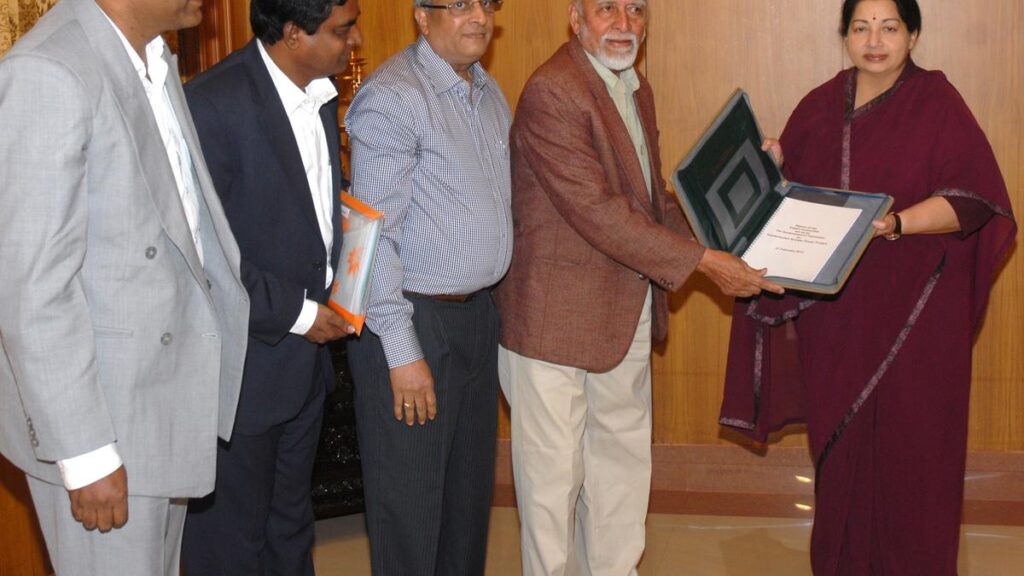
Game-changer: In February 2012, amid intense protests, the government announced the constitution of an expert committee, which included M.R. Srinivasan, former Chairman of the Atomic Energy Commission, to go into the plant’s safety system. The photo shows Srinivasan
handing over the report to Chief Minister
Jayalalithaa.
| Photo Credit: THE HINDU ARCHIVES
In September 2011, amid intense protests by activists and residents of Idinthakarai village in Tirunelveli district, Chief Minister Jayalalithaa wrote to Prime Minister Manmohan Singh, urging him to halt the 2000-MW Kudankulam Nuclear Power Plant Project until apprehensions about the plant’s safety were addressed.
“The last few days have been very agonising for the people of Kudankulam as they are under great apprehension in the wake of the Fukushima (Japan) disaster and similar calamities reported in the press. It is only natural that the people living here fear for the safety of their families and for themselves,” Jayalalithaa said, accusing the Centre of “abdicating its responsibilities”.
Narayanasamy deputed to meet protesters
A report in The Hindu said that hours later, Singh called up Jayalalithaa and informed her that he was deputing Minister of State in his office V. Narayanasamy to meet the protesters and allay their apprehensions. She responded that she would send an an all-party delegation, led by Finance Minister O. Panneerselvam along with representatives of the people, to the Prime Minister. She urged Singh to send competent officials to hold discussions with the people of Kudankulam and convince them to their satisfaction.
Curiously, only a few days earlier, she had said there was no need for any apprehension about the project as adequate safety measures were in place. However, she changed her mind as protests intensified. Besides, the local bodies elections were nearing. Back then, the protests were led by S.P. Udayakumar, who had organised the villagers under the banner of People’s Movement Against Nuclear Energy (PMANE).
The following month, addressing a campaign meeting in Tirunelveli, Jayalalithaa told the protesters, “I will be one among you on this issue.” This was just a day after the Prime Minister had reached out to her seeking help in implementing the project. Pointing out that the issue had become “emotive and controversial”, she told journalists that the issue could not be resolved by the State overnight.
The first signs of the Jayalalithaa government’s inclination towards changing its stance against the project came four months later. In February 2012, the government announced the constitution of an expert committee on the project. A key member of this committee was M.R. Srinivasan, former Chairman of the Atomic Energy Commission, a known votary of the project (He passed on Tuesday, May 20, 2025). The committee comprised D. Arivuoli, Professor of Physics and Director of Crystal Growth Centre, Anna University; S. Iniyan (convenor), Professor and Director, Institute of Energy Studies, Anna University; and L.N. Vijayaraghavan, a former Additional Chief Secretary.
Jayalalithaa had earlier informed the Assembly that the committee would go into the safety system of the proposed plant and the “perceptions and apprehensions” of the local population. The State government would take the next step on the basis of the committee’s report, while another committee of experts, constituted by the Central government, had completed its work a few months earlier.
Srinivasan was one of those who had always felt that the project was in the interests of Tamil Nadu and the Southern States to meet their energy requirements. He had publicly backed the project, insisting that it was a safe and reliable programme and shared his expectation that Jayalalithaa would extend solid support to it.
Task done in three weeks
The committee completed its task within three weeks. “Let the government have a cool view of the report,” Srinivasan said. Commenting on the safety aspect, he said, “I have not taken back my words on the issue.” When a journalist asked if the committee had any time schedule for the government to act on its report, Srinivasan responded, “We don’t want to suggest any timetable.”
Simultaneously, the government invited a PMANE delegation for talks. After the meeting, Mr. Udayakumar said, “The Chief Minister gave us a patient hearing. She assured us that she would go through the documents carefully. She did not express any opinion.”
Days later in March 2012, accepting the report of the expert committee, a meeting of the Tamil Nadu Cabinet, chaired by Jayalalithaa, resolved to take steps for the early commissioning of the plant. The Cabinet also decided to execute a ₹500-crore package of development projects in Kudankulam, especially for the welfare of the local fishermen. Jayalalithaa, thereafter, issued a statement, calling upon all to cooperate with the government. She said the reports of the two committees of experts and the petitions given by the protesters were “exhaustively scrutinised”. “There was no possibility of the occurrence of an earthquake or tsunami, and anyway the plant had the best safety features,” she declared.
Relief to traders and industry
“The decision came as a relief to a large section of people, especially trade and industry, who are bearing the brunt of a power crisis, but drew adverse comments from activists and parties opposed to nuclear energy,” wrote The Hindu.
“Meanwhile, nine persons, including two members of the anti-KKNPP struggle committee S. Sivasubramanian and K. Rajalingam, were arrested near the project site at 12.45 p.m. Though the Kudankulam parish priest, Thatheus Rajan, was also present, he was not arrested. Even in the early hours, reports trickled in that the police force was being reinforced at Kudankulam. About 3,000 personnel mobilised for the Sankarankoil by-election were moved to the area immediately after polling was over on Sunday,” the report said.
After a gap of more than six months, officials of the KKNPP were allowed by the Tirunelveli district administration to enter the project site. The rest is history.
Published – May 20, 2025 10:02 pm IST

